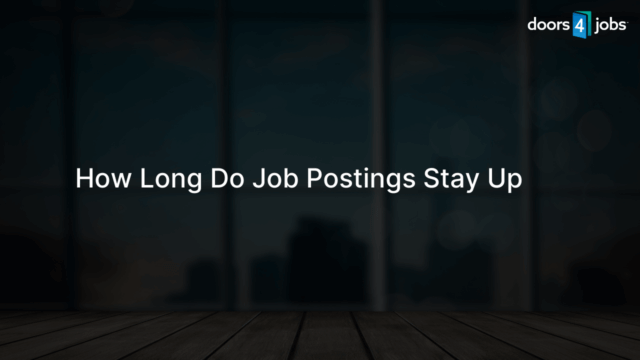It typically takes six weeks to six months to find a new job, considering factors such as industry, skill level, and job market demand. However, this duration may vary depending on individual circumstances and job search strategies.
Factors Affecting Job Search Duration
Several factors can influence how long it takes to secure a new job. These include:
- Industry and job market demand
- Experience and skill level
- Networking and connections
- Job search strategies and tools
- Geographical location
Industry and Job Market Demand
Different industries have varying job market demands, which can impact the time it takes to find a new job. High-demand industries tend to have more available positions, speeding up the job search period.
Experience and Skill Level
Job seekers with more experience and valuable skills usually have an easier time finding new positions. On the other hand, those with limited experience or niche skills might spend more time searching.
Optimizing Your Skills and Experience
To enhance your employability, continually develop your skills and gain relevant experience. Professional certifications, volunteering, and internships can boost your resume and shorten your job search time.
Networking and Connections
Having a solid network and connections in your industry can significantly reduce the time it takes to find a new job. Your network can inform you about available positions, give recommendations, or even assist in securing interviews.
Building Your Network
Consider joining industry groups, attending networking events, and engaging in online forums to build your network. A strong online presence, particularly on LinkedIn, can also help to expand your connections.
Job Search Strategies and Tools
Efficiently using job search strategies and tools can expedite the job-hunting process. Tailoring your resume, using job search engines, and following up on applications effectively can lead to quicker results.
Maximizing Job Search Strategies
Employ the following tactics for an efficient job search:
- Create a tailored resume and cover letter for each application
- Use job search engines and sign up for job alerts
- Follow up on submitted applications
- Track job search progress and results
Geographical Location
The region in which you are searching for a job can impact the duration of your job search. Competitive job markets or locations with fewer available positions might result in extended search periods.
Locational Flexibility
If possible, be open to relocating or expanding your job search to areas with a higher demand for your skills and experience, as this can lead to quicker job offers.
Personalizing Your Job Search
Designing your job search strategy around your unique goals, skills, and preferences can lead to a more efficient and rewarding process. Reflect on your career objectives, preferred industries, and ideal work environments to guide your search and create customized application documents.
Aligning Job Criteria with Personal Goals
Consider the following aspects to refine your job search and ensure a good fit:
- Company culture and values
- Long-term career objectives
- Work-life balance and flexibility
- Compensation, benefits, and growth opportunities
Handling Rejection and Staying Positive
Job searching can sometimes be frustrating and discouraging if it takes longer than anticipated. Remember that rejection is a part of the process, and maintaining a positive attitude can help you persevere and succeed in the long run.
Coping Strategies for Job Searching
Utilize these coping strategies to maintain optimism and motivation:
- Set realistic and achievable goals
- Learn from rejections and ask for feedback
- Practice self-care and stress-reducing activities
- Stay organized and track your job search progress
Utilizing Professional Help
If your job search is significantly longer than expected, you might benefit from professional assistance. Career coaches, resume writers, and employment agencies can help you refine your job search strategy, improve your application materials, and connect you with potential job opportunities.
Choosing a Career Professional
When selecting a career professional, consider their experience, success rate, and industry focus. Reach out to your network for recommendations or conduct research to find experts who align with your goals and values.
FAQs About Job Search Duration
Based on the insights provided in this blog post, find below some frequently asked questions that address common concerns related to the duration of job searches and related factors.
How can I speed up my job search?
To expedite your job search, optimize your resume and cover letter, expand your network, use job search engines effectively, be open to relocation, and consider seeking professional assistance from career experts.
Does the duration of my job search depend on my experience level?
Yes, your experience level can impact the duration of your job search. Experienced candidates with high-demand skills tend to find jobs more quickly, while those with limited experience or niche skills might face longer search times.
How important is networking in my job search duration?
Networking is crucial in most job searches, as it can help you access unadvertised positions, obtain referrals, and receive valuable information regarding job opportunities that may not be publicly advertised.
Is it worth trying a different job search strategy if my current one is not yielding results?
Definitely. If your current strategy is not delivering the desired outcomes, it’s worth analyzing your approach, identifying areas for improvement, and implementing new tactics or tools to enhance the effectiveness of your job search.
How can I maintain positivity during a lengthy job search?
To stay positive during a longer-than-expected job search, set realistic goals, practice self-care, learn from rejections, ask for feedback, and remember that persistence and resilience are key in ultimately securing a new position.











